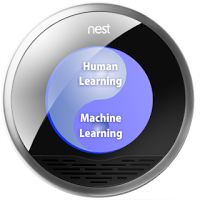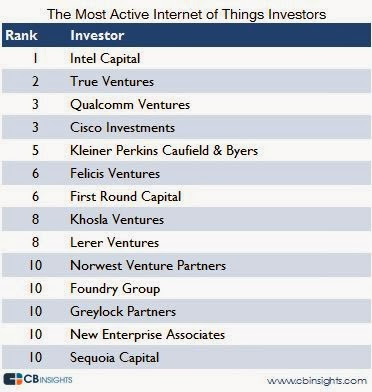 Nicholas West
Nicholas West
Activist Post
Google’s $3.2 billion acquisition of Nest Labs has become a top news story. However, this is about far more than Google taking a major position in the future of Smart Home technology as it currently exists. Google’s other major recent acquisition was in the area of robotics; and, significantly, artificial intelligence. This is where the story takes on new meaning.
These major purchases indicate that Google is poised to automate the concept of Smart Homes to a far greater degree than has been possible before.
According to leading tech site, Gigaom, the robot invasion is about to begin in earnest as we move on to an expanded landscape interconnected and managed by an “Internet of Things.”
Until this point, the Smart Home has been largely conceptual due to the need for manual implementation by the end user. However, Google aims to introduce robotic intelligence in such a way that ease of use will be immensely expanded. It is this level of automated convenience that will be required for full adoption by the non-tech inclined.
We often think of robots only in the humanoid sense – and indeed Google has invested in that element as well, as they seek to bring autonomy from the assembly line to delivery. But, as Gigaom explains, robots and their attendant “intelligence” can be any size and in any form, so long as they maintain a key feature.
…Robots are defined as any machine that is “smart” enough to make autonomous decisions. So the Nest is a little robot. In fact, the Nest VP of Technology Yoky Matsuoka is a former robotics professor and researcher. She was responsible for the Nest UI as well as developing algorithms — and with the acquisition she’ll be returning home to Google, as before she joined Nest she worked at Google X, Google’s moon shot lab.
In an interview with Alexis Madrigal from The Atlantic, Matsuoka gave insight into why Google would be so interested in their latest acquisition.
Nest is a cryptorobotics company. It deals in sensing, automation, and control. It may not make a personable, humanoid robot, but it is producing machine intelligences that can do things in the physical world. (1) [emphasis added]
This mission to add intelligence embedded in physical objects can also be seen in the other companies that Google has scooped up as of late:
Over the last half-year, Google has quietly bought up seven technology companies in an effort to create a new generation of robots. The engineer heading the effort is Andy Rubin, the man who built Google’s Android software into the world’s dominant force in smartphones. (2)
Industrial Perception worked on robotic vision and artificial intelligence, again for the logistics sector. (3) [emphasis added]
 What we are witnessing is Google consolidating the companies that are central to building the architecture of this new Internet. In early 2012 David Petraeus spoke to the CIA venture capital firm In-Q-Tel. He stated rather matter of factly that that an “internet of things” was already taking shape.
What we are witnessing is Google consolidating the companies that are central to building the architecture of this new Internet. In early 2012 David Petraeus spoke to the CIA venture capital firm In-Q-Tel. He stated rather matter of factly that that an “internet of things” was already taking shape.
It’s not only the elective consumer gadgets like smartphones and whatever new video game system is being introduced. It will be all appliances and every object that can be given sensors to collect information and connect to the overall Smart Grid and beyond.
Little robots invading the home
Ali Kashani, VP Software at Energy-Aware, a company building an energy sensor and app for the home . . . asks, “Instead of adding new objects to our lives, what if everything in our lives is intelligent? It’s a very small natural evolution to the internet of things. The internet of things right now means connected devices but if you take it one step forward you get the killer app for IoT.” This intelligence applied across all manner of devices and embedded in our economy is also how we will likely solve the looming gap between the virtual economy and the delivery of physical goods. [emphasis added]
How do you train the robot army?
But when it comes to the smart home Kashani is right about artificial intelligence being the killer app. Kevin Tofel and I spent a lot of time discussing this on the podcast. We call it the anticipatory home… [emphasis added]
In other words, before you determine what you might need from the objects around you, they already have made that decision, stored the data, reported it for analysis and wait only for further instructions from the ruling algorithm.
We should also keep in mind that this technology is not happening in a vacuum; it is supported by a political/corporate will to keep alive the concept of man-made global warming as a core reason for governmental concern for the energy consumption of its citizens. That governmental interest, in fact, could be seen as the real “ruling algorithm.”
An announcement from libertarian site Personal Liberty Digest is titled, “Obama Administration Seeks Volunteers Who Want Government To ‘Score’ Their Home Energy Consumption” where they state:
The U.S. Department of Energy will introduce new software tomorrow that allows volunteers to begin assessing energy consumption in their homes by using “scoring” criteria created by the government.
The software, dubbed the Home Energy Scoring Tool, is one tool in the Obama Administration’s effort to soft-sell energy consumption to private individuals.
But the President’s recent history of unilaterally promulgating green energy rules and mandates from within the Executive Branch suggests there’s nothing to keep the program, which is now voluntary, from one day becoming policy.
As it stands, volunteers can pay an assessor to visit their homes and compile a list of variables that affect the government’s energy “score” that are unique to each home. Then the software decides how much energy each home should be consuming over the course of a year, and benchmarks that amount as the standard from which the home’s real energy usage will deviate. It assigns a numeric energy consumption score on a 1-10 scale, and compares how a home is faring relative to others in the same zip code.
As more homeowners voluntarily sign on for the program, the National database of information surrounding domestic energy consumption will grow, presumably achieving a size sufficient for the government to begin drawing generalizations about what amount of power usage is expected of a “typical” household. (4) [emphasis added]
 This world is being built, and with Google now manning the helm of the ship of state we can expect a much faster and coordinated roll-out. Moreover, since this technology is being subsumed into Google’s holdings, it offers them a way to further integrate all platforms. This raises obvious privacy concerns about how data will be collected, stored, and shared … and for what purpose(s).
This world is being built, and with Google now manning the helm of the ship of state we can expect a much faster and coordinated roll-out. Moreover, since this technology is being subsumed into Google’s holdings, it offers them a way to further integrate all platforms. This raises obvious privacy concerns about how data will be collected, stored, and shared … and for what purpose(s).
As tech writer Stacey Higgenbotham notes, a visit to the Nest Blog’s FAQ section seeking answers about the potential coordination between Nest and Google’s products did very little to alleviate her concerns over privacy and the use of her personal data.
The answer is not yet in terms of any product integration. But it seems clear to anyone that isn’t naive that if Google wants to integrate Nest data into its massive stores of information, all it has to do is release a new and improved Nest product and service. And Google could most certainly do that.
As a user of Google Now, the contextual service that tells me when to leave my house to make it to my next appointment in time, I see no reason Google couldn’t also tell my thermostat to cycle down before I actually leave. Or, based on my movements in my home, Google could start screening my calls. If I’m in the bedroom and motionless maybe Google could block the work calls from my colleague Om Malik. (5)
As a society, we already have embraced our smart gadgets to a dangerous degree, as is admitted to within the concerns posted above. Every privacy violation that has been revealed continues to warn us that we are putting too much trust in this technology and the companies delivering these products. We must stop voluntarily complying with a system that will eventually eradicate our ability to live a life free from surveillance and control.
Here are two tweets from readers of The Verge which further encapsulate the challenges we face:
There is no way Google is going to be able to resist doing something with the data collected from Nest thermostats/smoke+CO detectors
— Brian Klug (@nerdtalker) January 13, 2014
Watch what happens when Google aggregates your online data tied to a location to what is going on physically in your home via Nest.
— Randy Picker (@randypicker) January 13, 2014
There is still time to opt out while the system remains under construction and attempts to generate consumer interest and widespread political support. It likely cannot fully completed unless we fall prey to the propaganda that machine systems are more intelligent than we are, and that we need to be saved from ourselves through the implementation of a full technocratic management system over every facet of our lives.
Here are some other companies to keep an eye on as the Internet of Things continues its roll-out and Google continues to invest. If anyone would like to contribute to researching these companies and spreading the word, please contact us here, and we will consider publishing your article.
 |
| image source with additional information can be found here. |
Main Source:
http://gigaom.com/2014/01/14/lets-talk-about-robots-googles-nest-acquisition-brings-ai-to-the-smart-home/
Other sources:
- http://www.33rdsquare.com/2014/01/why-google-may-have-bought-nest.html#more
- http://www.33rdsquare.com/2013/12/google-swallowing-up-robotics-companies.html
- http://gigaom.com/2013/12/04/google-gets-into-the-robot-game-with-former-android-chief-rubin-leading-the-effort/
- http://personalliberty.com/2014/01/13/obama-administration-seeks-volunteers-who-want-government-to-score-their-home-energy-consumption/
- http://gigaom.com/2014/01/13/when-google-closes-the-nest-deal-privacy-issues-for-the-internet-of-things-will-hit-the-big-time/
Further reading:
- For an excellent assessment of the health implications beyond the scope of the above article, please read the latest article from Josh del Sol, Producer and Director of Take Back Your Power. https://www.activistpost.com/2014/01/the-real-consequences-of-corporatism.html
- For the economic implications of the Smart Society, please visit Julie Beal’s site Get Mind Smart for a comprehensive view of the endgame if we don’t take action to thwart the long-developed plans of a technocratic elite.


Be the first to comment on "Google Validates Putting Robotic Intelligence in Every Home"